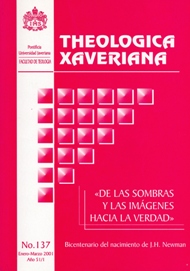Abstract
John Henry Newman (1801-1890), uno de los pensadores religiosos más sobresalientes del siglo XIX en Inglaterra, avanzó rápidamente en sus estudios y a los quince años llegó a ocupar el primer puesto en su escuela de Ealing. Sin lograr formar sus convicciones religiosas, sintió la atracción del escepticismo, pero a fines de 1816 su pensamiento experimentó un gran cambio y se hizo cristiano; más tarde, en Oxford, se hizo ministro de la Iglesia Anglicana y predicador en la Iglesia de Nuestra Señora. Después de un viaje a Italia, en
1833, se convirtió en el dirigente principal del Movimiento de Oxford, tendiente a presentar la fe cristiana en su integridad en una iglesia corrompida por el protestantismo. Newman, gracias a sus profundos conocimientos de las fuentes de la revelación, de las Escrituras y de los Padres, unidos a una vida de oración y después de dos años en Littlemore, se hizo católico en 1845 y fue ordenado sacerdote en 1847. El papa León XIII lo hizo cardenal.
This journal is registered under a Creative Commons Attribution 4.0 International Public License. Thus, this work may be reproduced, distributed, and publicly shared in digital format, as long as the names of the authors and Pontificia Universidad Javeriana are acknowledged. Others are allowed to quote, adapt, transform, auto-archive, republish, and create based on this material, for any purpose (even commercial ones), provided the authorship is duly acknowledged, a link to the original work is provided, and it is specified if changes have been made. Pontificia Universidad Javeriana does not hold the rights of published works and the authors are solely responsible for the contents of their works; they keep the moral, intellectual, privacy, and publicity rights.
Approving the intervention of the work (review, copy-editing, translation, layout) and the following outreach, are granted through an use license and not through an assignment of rights. This means the journal and Pontificia Universidad Javeriana cannot be held responsible for any ethical malpractice by the authors. As a consequence of the protection granted by the use license, the journal is not required to publish recantations or modify information already published, unless the errata stems from the editorial management process. Publishing contents in this journal does not generate royalties for contributors.


